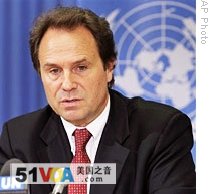Geneva
02 July 2009
The World Health Organization warns about two-million internally displaced people in Pakistan's Swat Valley are at increased risk of getting ill during the upcoming monsoon season. The World Health Organization said it may not be able to help all those in need because of lack of funds.
The monsoon season is looming. And, for many of the two-million people in Pakistan's conflict-ridden Swat Valley who were forced to flee their homes, this could spell trouble.
 |
| WHO Assistant Director-General, Dr. Eric Laroche (File) |
He said he expects outbreaks of water-borne diseases, particularly diarrhea, acute respiratory infections and malaria.
"We need to be pre-positioning drugs against diarrhea, drugs against pneumonia, drugs against malaria and soon, mosquito nets. Everything is geared toward treating these diseases," he said.
But, money is a problem. Dr. Laroche said the World Health Organization has only received $2 million of its $10 million appeal for essential drugs. He said lack of money will make it very difficult to contain disease outbreaks.
About two-million people fled their homes during the peak of fighting between the Pakistani government and Taliban militants. About 10 percent, or 200,000 of them are in camps. The other 90 percent are staying with family and friends.
Dr. Laroche said he is most worried about that group, the 90 percent or 1.8 million internally displaced people living with host families. He said the camps are well run and have health-care facilities for treating the sick and injured. He said such care is not available for the people living in private homes.
He said the over-crowded conditions in host families will lead to a lot of health problems and increased disease. He said a major challenge facing WHO is to try to reach these people and provide them with preventive care to ward off disease. And, if that fails, he said health workers must be able to provide sick people with life-saving treatment.